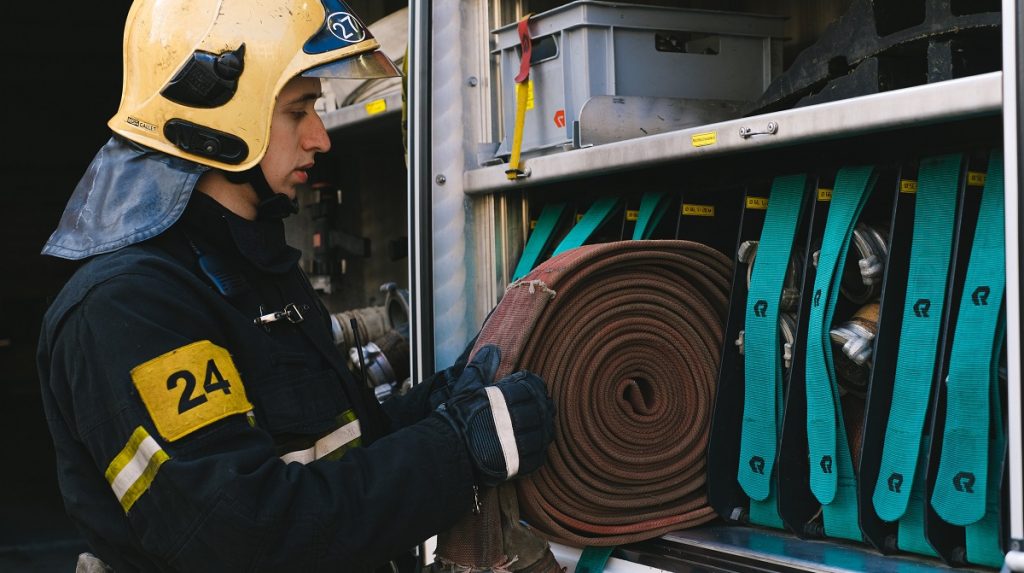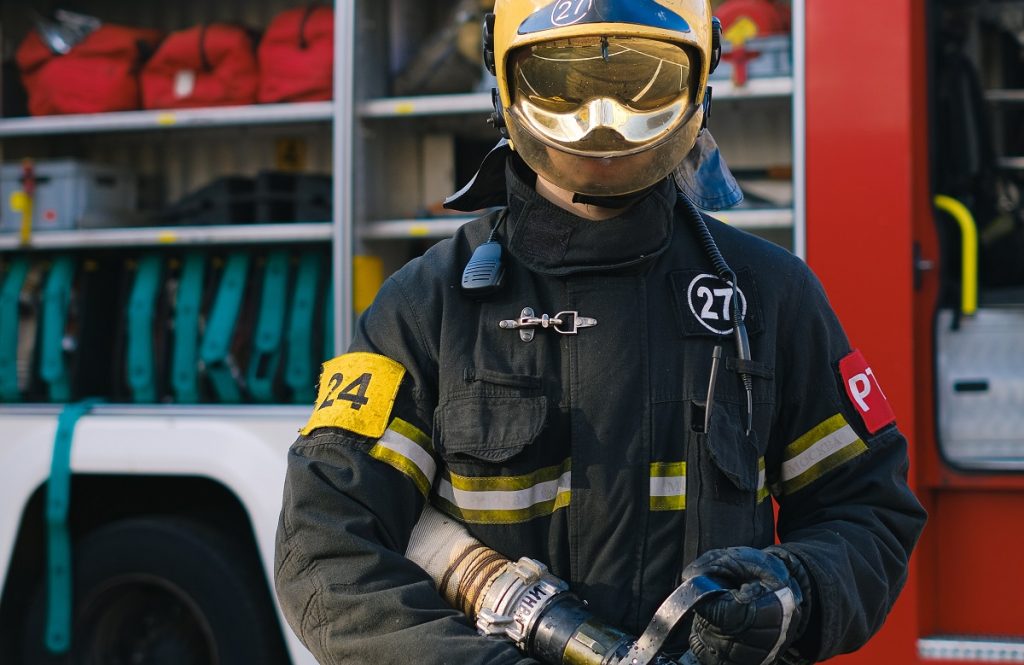Interviewing for a firefighter role is an immense challenge that tests your skills, knowledge, and ability to perform under pressure. With your dream career on the line, delivering compelling responses to interview questions is crucial. However, preparing for these interviews goes beyond just practicing common questions. By taking the HIGH5 strengths assessment, you can gain a deeper understanding of your unique strengths and how to effectively showcase them during the interview process.
This personalized insight can help you communicate your qualifications more confidently and stand out from other candidates. The HIGH5 assessment empowers you to identify and leverage your strongest attributes, allowing you to demonstrate why you are the ideal fit for the firefighter role. With thorough preparation guided by your personal strengths profile, you can ensure you put your best self forward and increase your chances of landing your dream job. In this article, we will cover the most common questions asked during firefighter interviews so that you can make sure you are ready to face them.
What skills are important for firefighters?
Here are the qualities employers expect to see from someone applying for a firefighter role:
Communication
Effective communication is vital for firefighters to understand instructions, relay critical information, and collaborate with team members in high-pressure situations.
Problem-solving
Firefighters must quickly assess situations and develop solutions to prevent further damage or injury during emergencies.
Attention to detail
Firefighters need to be precise in identifying risks, following safety protocols, and managing equipment to ensure successful operations.
Time management
Firefighters must be efficient with their time, responding quickly to emergencies and managing their tasks effectively.
Adaptability
In rapidly changing environments, firefighters must adjust their strategies on the fly to handle unpredictable circumstances.
Spatial awareness
Firefighters need a strong sense of space and environment to navigate dangerous situations safely and effectively.
First aid
Firefighters are often the first responders to medical emergencies, so having comprehensive first aid skills is essential for providing immediate care.
Teamwork
The ability to work seamlessly with others is crucial, as firefighting is a team-based profession where coordination and collaboration save lives.
Stress resilience
Firefighters need emotional strength and resilience to handle the physical and psychological demands of the job without compromising performance.
Self-awareness
Recognizing personal strengths and weaknesses allows firefighters to improve and adapt to the challenges they face.
Physical fitness
Firefighting requires immense physical strength and stamina to perform demanding tasks such as lifting heavy equipment and rescuing individuals in dangerous conditions.
17 firefighter job interview questions and answers

Let’s now dive into the most common firefighter interview questions and answers.
1. What are your strengths and weaknesses?
How to answer: One of my key strengths is working well under pressure. I thrive in high-stress situations where quick decision-making and immediate action are required. This strength is crucial in firefighting, where every second counts and lives are at stake. Additionally, my physical fitness and endurance allow me to perform demanding firefighting tasks with resilience and stamina.
However, my weakness lies in my inclination towards perfectionism. While this drives me to achieve high standards, it can sometimes lead to unnecessary stress on myself and potentially slow down decision-making processes. I am actively working on balancing my drive for perfection with the need for timely action, especially in emergencies where immediacy is more critical than perfection.
Pro Tip From HIGH5
HIGH5’s free strengths test is a valuable tool for individuals preparing for their firefighter interviews or any role that demands a clear understanding of one’s strengths and weaknesses. By taking this 20-minute, scientifically validated psychometric test, you can discover your top 5 strengths. Moreover, understanding your weaknesses or areas for improvement through the lens of your strengths can help you address interview questions more strategically.
Rather than viewing weaknesses as limitations, you can discuss them as areas for growth and development, showing your self-awareness and commitment to continuous improvement. Knowing these strengths can not only boost your confidence but also enable you to articulate clearly what you bring to the table during interviews. Adding these strengths to your resume or CV can set you apart from other candidates by showcasing what you are capable of and what you are naturally good at and energized by.
2. Why are you interested in becoming a firefighter?
Interviewers may ask this question to understand why you’re applying for the job and what motivates you.
How To Answer: I have always been passionate about helping others, and being a firefighter allows me to do just that. I also love the challenge of responding to dangerous situations with courage and resilience. Being a firefighter would be an incredibly fulfilling career for me, and I’m excited about the prospect. In addition, I have a great deal of respect for the firefighting profession and am eager to join a team dedicated to preserving public safety. Plus, there are many opportunities to learn more about fire science and gain specialized skills. These are just some reasons I am interested in becoming a firefighter.
3. What training or experience do you have that qualifies you to be a firefighter?
This question is designed to assess your qualifications and skills related to firefighting. Interviewers may also use it to gauge how prepared you are for the job.
How To Answer: I have undergone extensive training to prepare myself for a career in firefighting. This includes earning my EMT certification, taking advanced fire safety classes, completing wilderness first aid courses, and shadowing several local firefighters at their stations. I also received specialized instruction on hazardous materials handling, search and rescue protocols, incident command systems, rope rescue techniques, and more. In addition to the training I’ve received, I have experience using fire fighting equipment, working in a team setting, and problem-solving under pressure. My qualifications and experience make me an ideal candidate for this position.
4. What is the primary role of a fire department?
Interviewers may ask this question to understand your knowledge about the profession.
How To Answer: The primary role of a fire department is to respond to emergencies related to fires, medical emergencies, hazardous materials spills, unsafe weather conditions, and other disasters that can threaten public safety. Firefighters provide life-saving services by putting out fires and rescuing people from dangerous environments. They also provide medical attention to injured or sick individuals and help protect people from further harm. Additionally, they educate the public on fire safety measures and other safety protocols. Ultimately, fire departments play an essential role in preserving lives and property by responding quickly to emergencies.
5. What do you think are the essential qualities of a firefighter?
Interviewers may ask this question to understand what qualities you believe are essential for success as a firefighter.
How To Answer: I believe that the essential qualities of a firefighter are courage, resilience, empathy, physical fitness, communication skills, problem-solving abilities, teamwork skills, adaptability, and situational awareness. Courage is necessary for firefighters to be able to enter dangerous environments. At the same time, resilience is essential for handling the physical and emotional strain of the job. Firefighters must also have empathy to show compassion for victims of fires or other disasters. Physical fitness is essential for firefighters who need to perform strenuous tasks such as carrying heavy equipment up flights of stairs or scaling ladders to rescue people from burning buildings.
Communication skills are essential for coordinating search-and-rescue efforts and working effectively as a team. Problem-solving abilities allow firefighters to assess complex situations and develop solutions on the spot quickly. Adaptability is necessary for adapting strategies and plans when faced with unexpected obstacles, while situational awareness helps firefighters make split-second decisions in high-pressure environments. Ultimately, I believe these are the qualities that make a great firefighter.
6. What is the best way for you and your family to deal with your unusual work hours?
Interviewers may ask this question to understand how you would manage the unique challenges associated with working irregular shifts and long hours.
How To Answer: The best way for my family and me to deal with my unusual work hours is by establishing a solid routine and mutually agreed-upon expectations. For example, when I am on shift, I will keep in touch with my family members throughout the day so that they know what my schedule looks like. This can involve setting up regular phone or video calls, exchanging text messages, or even checking in through social media.
Additionally, I plan by scheduling meals or other activities together before I go on shift and ensuring that everyone has clear expectations for what will happen if I get home late. Finally, I make sure to use my days off or downtime to spend quality time with my family, catching up on chores and errands, or taking trips together so that we can all stay connected despite my long hours. With this approach, I can better manage the unique challenges associated with working irregular shifts while maintaining a solid relationship with my family.
7. What would you do if you were ordered to do something that put you in harm’s way?
This question is intended to assess how well you can handle situations that could compromise your safety and well-being.
How To Answer: If I were ever ordered to do something that put me in harm’s way, I would take the necessary steps to protect myself. This could involve raising a safety concern with my superiors and refusing to perform unsafe tasks if it posed too much risk for myself or others. Additionally, I would document any orders given and any safety concerns raised so that there is a record of the situation. Ultimately, I believe it is essential to understand your limitations and follow policies and procedures when facing hazardous conditions.
8. What Would You Do If Two Orders Contradicted Each Other on a Scene?
This question assesses how you handle conflicting instructions or information in dynamic situations.
How To Answer: If I ever received two contradictory orders on a scene, I would assess the situation, weigh my options, and decide based on what is most safe and beneficial. I believe it is essential to remain professional in these situations and not be influenced by personal biases or preferences. To get to an optimal solution, I may ask additional questions of my supervisors or colleagues to clarify instructions, better understand the relevant context, or discuss alternate approaches. Ultimately, ensuring everyone has accurate information and considering all possible solutions is critical when faced with conflicting orders.
9. Why are you interested in this department, and how can you help contribute?
This question is intended to gain insight into your motivations and capabilities to contribute to the department.
How To Answer: I am interested in this department because I believe my experience and skill set is well-suited for the role and responsibilities of this position. In particular, I have extensive knowledge in the field, strong organizational and problem-solving abilities, and a passion for making a positive difference in my community. Additionally, I am eager to learn more about working in a fire department as it has always been a deep personal interest of mine.
Regarding how I can help contribute to this department, I would bring my enthusiasm, creativity, and dedication to the team while also learning from others who have much more experience than me. This combination of hard work, attention to detail, and willingness to learn will help me to make an immediate and impactful contribution.
10. What Would You Do if Confronted by an Angry Citizen?
This question is intended to assess how well you can handle potentially volatile situations with members of the public.
How To Answer: If an angry citizen ever confronts me, my priority would be to remain professional and try to de-escalate the situation as much as possible. I believe it is essential to listen carefully and not take any behavior personally while setting clear boundaries when necessary. Additionally, I would document all interactions to ensure the accuracy of the information and focus on resolving the underlying issue. I could request support from other officers or supervisors if the situation became too difficult for me. Ultimately, ensuring everyone remains calm and safe should be a priority when faced with an angry citizen.
11. Why Would Someone Conduct a Secondary Search?
This question will evaluate your understanding of the importance of searching a location twice during an active incident.
How To Answer: Conducting a secondary search is essential because it helps to ensure that all evidence or potential threats are identified and addressed. During the first search, officers may have been unable to thoroughly inspect certain areas or have overlooked something in the heat of the moment. A secondary search can help confirm that nothing was missed from the initial sweep and investigate any additional leads or clues that were not discovered earlier. Moreover, conducting multiple investigations increases accuracy and efficiency while also helping to prevent any potential danger for everyone involved.
12. What is your ideal salary range?
This question is intended to determine the salary you expect for the position.
How To Answer: My ideal salary range would depend on this role’s specific duties and responsibilities and how my experience and skill set would be used. With that in mind, I am confident that a fair and competitive compensation package commensurate with my qualifications can be agreed upon. For example, I have recently researched similar positions in this field and found that they typically offer salaries ranging from $XX – $XX per year (or hourly). However, I understand every situation is unique, so I am open to discussing different arrangements depending on the specifics of this role.
13. What makes you feel the most accomplished in your work?
This question is intended to understand what motivates you in your job and career.
How To Answer: I feel most accomplished when I can help others or make a lasting impact on the community. This could be through directly helping people in need, developing innovative solutions to problems, or taking the initiative and leading projects that benefit those around me. No matter the task, I take pride in my work and enjoy seeing the results of my efforts. Additionally, being recognized for my hard work and dedication by colleagues makes me feel even more accomplished and encourages me to continue pushing myself to reach success.
14. Tell me about a time you had to manage a challenging situation with a colleague
This question assesses how well you can work with others and handle conflicts.
How To Answer: Recently I was faced with a difficult situation where I had to manage a disagreement between two colleagues. The issue stemmed from a misunderstanding about the scope of their duties, which resulted in each of them feeling that the other’s responsibilities were being taken over.
As such, I began by listening attentively to both sides and attempting to gain an understanding of the underlying problem. After assessing the situation, I concluded that it would be best for me to facilitate a conversation between them to create an open dialogue surrounding their concerns. During this discussion, I clarified any confusion regarding tasks and responsibilities and identified potential solutions to the dispute. Ultimately, both parties were able to reach a compromise and move forward more productively.
15. What are some adjectives your friends would use to describe you?
Interviewers ask this question to gain insight into your personality, character traits, and how you interact with others.
How To Answer: My friends would likely describe me as dependable, hardworking, and reliable. I am very dedicated to my work and take pride in consistently producing quality results. Additionally, I have strong interpersonal skills that allow me to communicate effectively and collaborate with others. My friends also know that I am a supportive friend who is always willing to lend an ear or provide advice when needed. Lastly, they can attest to my sense of humor which allows for great conversations and enjoyable experiences.
16. What inspires you to progress further in your occupation?
This question assesses what motivates you and drives your ambition.
How To Answer: I’m continually inspired to progress further in my occupation through the accomplishment I experience after completing a task or project successfully. Knowing that I have made a lasting impact and contributed positively towards the organization’s success keeps me motivated and eager to continue pushing myself. Additionally, I am always looking for new opportunities to learn, grow, and take on additional responsibilities, allowing me to expand professionally and personally. Lastly, continuously striving towards higher goals provides me with a sense of purpose and satisfaction, which is why I work hard every day.
17. In five to ten years, where do you imagine yourself?
Interviewers want to know if your long-term career goals align with their organizations.
How To Answer: Five to ten years from now, I envision myself in a managerial role within the firefighting profession. With the expertise, experience, and knowledge I have acquired over time, I hope to be able to use my skills to lead a team of firefighters and protect those in need. Additionally, I aspire to continuously stay up-to-date on the latest developments within the industry and explore new ways of improving operations. Ultimately, my goal is to make an impactful contribution where I can help save lives and inspire others along the way.
Questions for you to ask in a firefighter job interview
Knowing which questions to ask an interviewer is crucial to any successful job search.

Here are some questions you may consider asking during your firefighter interview.
How fast do you want to hire someone?
This question shows the employer that you are eager and willing to begin working immediately.
Who will be my direct supervisor?
Knowing who your direct supervisor will be is essential to ensure a smooth transition into the new role.
Can you give me an overview of your training process for new employees?
Gaining insight into the organization’s onboarding process allows you to develop realistic expectations of what it would be like if you were hired.
How often do you give performance reviews?
Performance reviews allow employers to evaluate employees’ work and provide constructive feedback when necessary. Asking this question indicates that you understand its importance and are interested in becoming part of a successful team.
What is the leadership style of this department?
By better understanding the department’s leadership style, you can determine if it would be a good fit for you and your work ethic.
What qualities and qualifications must an ideal candidate possess for this role?
This question allows you to assess how closely your skills match the job requirements while demonstrating that you want to provide value in any position you might take.
How do you prepare for a firefighter job interview?
Preparing for a firefighter job interview is essential to making a great first impression and setting yourself up for success. Here are some tips on how to prepare for a firefighter job interview.
Discover your unique strengths
Before the interview, take the HIGH5 strengths test to identify your top 5 strengths. Knowing these allows you to articulate how your natural talents make you an ideal candidate for a firefighter position. For example, if “Problem-Solving” and “Being Resilient” are among your top strengths, you can discuss how these abilities enable you to navigate challenging rescue operations and remain composed under pressure effectively.
Tailor your answers
Tailor your interview responses using your HIGH5 test results. Firefighting requires teamwork, quick decision-making, physical endurance, and emotional resilience. If your strengths include “Team Collaboration” and “Adaptability,” highlight specific instances where you’ve successfully worked in a team to address emergencies, adapt to rapidly changing situations, and support your crew in high-stress environments. This approach demonstrates your suitability for the role and your self-awareness and dedication to personal growth.
Understand and communicate your value in a team
HIGH5’s team effectiveness tools can help you understand how your strengths contribute to a team’s success. Firefighting is a team-oriented profession where each member’s contribution is crucial. Discuss how your strengths complement those of a potential team, fostering a collaborative and efficient work environment. For instance, if one of your strengths is “Empathy,” you can explain how this helps you emotionally support both victims and team members, enhancing team cohesion and morale during and after rescue missions.
Prepare for behavioral questions
Interviewers often ask behavioral questions to understand how you’ve handled past situations. Reflect on your HIGH5 strengths and think of examples that demonstrate these in action. For example, you could discuss a time when your “Risk Management” strength helped you make a critical decision that prevented a situation from escalating, illustrating your ability to balance courage with caution.
Highlight your development areas
HIGH5 also illuminates areas for growth, which is valuable in an interview. Being open about your development areas, framed through the lens of your strengths, shows humility and a willingness to learn and grow. For example, if “Strategic Thinking” is a development area, discuss how you work on it by seeking mentorship or training opportunities. At the same time, your “Operational Efficiency” strength ensures you can still make effective decisions.
Firefighter Interview Questions FAQ
What are the three responsibilities of a firefighter?
The three primary responsibilities of a firefighter are to respond to emergencies, provide medical aid, and operate firefighting equipment. Firefighters must also be able to assess risks and hazards when responding to an incident, participate in training activities, and manage resources such as personnel and supplies.
What are three essential qualities that firefighters need?
Firefighters need three essential qualities: physical fitness, emotional intelligence, and communication skills. Physical fitness is critical for safely performing tasks such as lifting objects or climbing ladders. Emotional intelligence helps firefighters remain calm during times of crisis and work well with others in stressful situations. Lastly, communication skills are necessary to coordinate operations between various team members.
How can I impress my firefighter interview?
Showcase your strengths by providing specific examples of teamwork, problem-solving, and stress resilience. Be confident, demonstrate knowledge of the role, and ask thoughtful questions about the department and its operations.
Conclusion
Before heading for a firefighting interview, it is essential to research and prepare for the interview. Make sure you know the types of questions that may be asked and how to handle them to make a positive impression on the interviewer. Finally, remember to stay confident and remain focused throughout the entire process.



![32 HR Coordinator Interview Questions and Answers [2023]](https://high5test.com/wp-content/uploads/2023/04/31-HR-Coordinator-Interview-Questions-and-Answers-2023-300x155.jpg)
